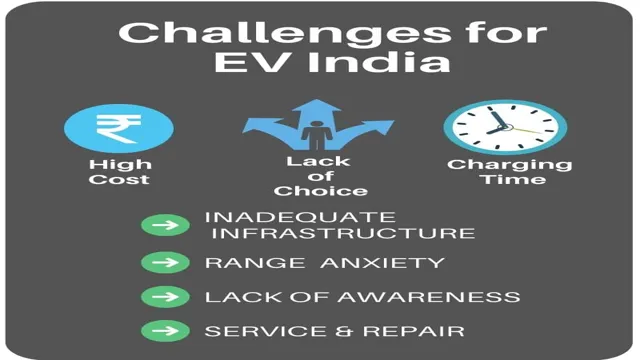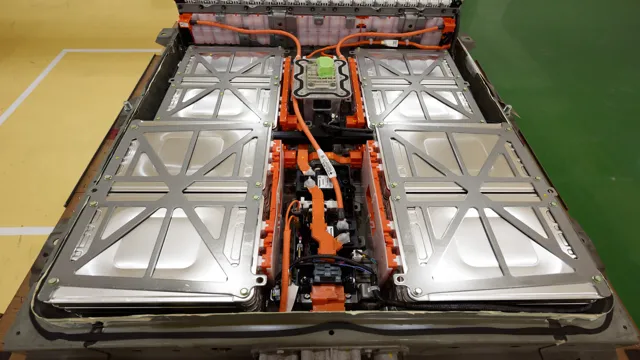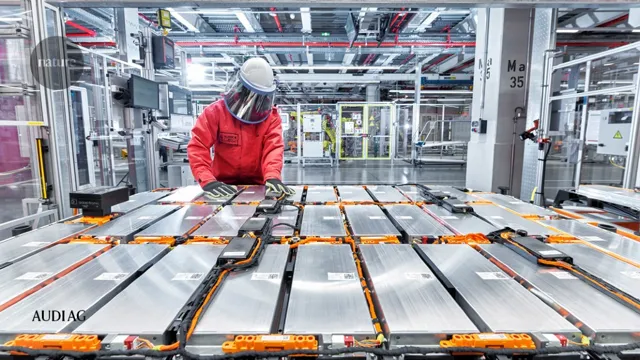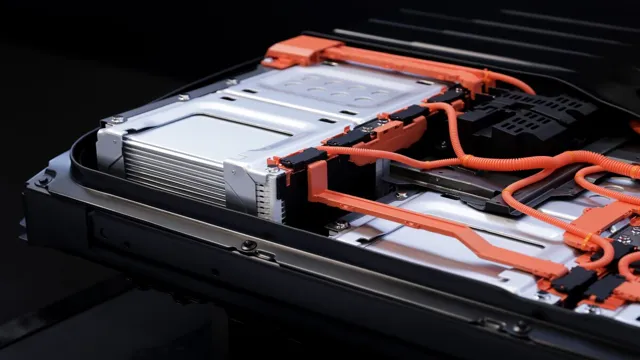Revolutionizing Transportation: Overcoming Electric Car Battery Challenges
Electric cars have gained immense popularity in recent years due to their eco-friendliness and energy efficiency. However, as with any new technology, these vehicles are not without their challenges. One of the most significant obstacles faced by the electric car industry is the issue of battery technology.
Despite significant improvements made in this area, a number of challenges still need to be addressed in order to make electric cars a viable alternative to traditional gasoline vehicles. One of the main challenges that electric car manufacturers face is the range anxiety of potential buyers. With limited charging infrastructure, many drivers worry about running out of power before they reach their destination.
Another challenge is the fact that current batteries are heavy and take up a lot of space, limiting the design options available to car manufacturers. Additionally, the cost of producing lithium-ion batteries remains high. That said, research into new battery technologies is ongoing, and there is reason to be optimistic.
Scientists are exploring a range of options, from solid state batteries to flow batteries, that could potentially solve the challenges facing the electric car industry. As these technologies continue to develop, the future of electric cars looks bright.
Battery Life Expectancy
Electric car battery challenges play a crucial role in determining how long your battery will last on the road. One of the most common challenges with electric car batteries is their shelf life. On average, electric car batteries can last up to 10 years, but this may vary depending on the car manufacturer, how the battery is cared for, and the climate of the region in which you live.
Additionally, the continuous use of fast chargers can cause battery degradation and reduce the life expectancy of your electric car battery. It’s essential to follow the manufacturer’s instructions and proper charging protocols to extend your battery life and get the most out of your electric car. Another vital consideration is the cost of replacing the battery.
While electric cars are more efficient and cost-effective to run, the cost of replacing the electric car battery is usually higher than the price of a standard car. This is crucial to consider when making a decision about owning or leasing an electric vehicle.
Short lifespan of Lithium-ion batteries
It’s no secret that lithium-ion batteries have a short lifespan. Most smartphone and laptop batteries start to degrade after a year or two of use. This is because lithium-ion batteries have a limited number of charge cycles.
Each time you charge and discharge your battery, it takes a small toll on its overall lifespan. Eventually, your battery will no longer be able to hold a charge, and you’ll need to replace it. So, how long can you expect your lithium-ion battery to last? It’s hard to say, as there are many factors that can affect the battery’s lifespan, such as temperature, usage, and charging habits.
However, on average, most lithium-ion batteries will last between 300 and 500 charge cycles. If you want to extend the life of your battery, try to avoid charging it to 100% all the time and don’t let it fully discharge. Additionally, keep your device out of extreme temperatures, as heat can also reduce your battery’s lifespan.
With proper care, you can make your lithium-ion battery last longer and avoid the cost of replacements.

Environmental effects: high temperatures and cold weather
One of the biggest environmental factors that affect the life expectancy of a battery is temperature, specifically high temperatures and cold weather. When a battery is exposed to extreme heat, such as being left in a hot car or in direct sunlight, it can cause the battery’s internal chemistry to break down and degrade faster. On the other hand, extremely cold weather can also affect the battery’s ability to hold a charge and discharge.
This is because cold temperatures slow down chemical processes inside the battery, making it harder for it to produce the energy needed to power the device. In both cases, it can lead to a shorter battery life expectancy and ultimately, reduced performance. Therefore, it is important to store and use batteries in a temperature-controlled environment to preserve their lifespan.
Just like how we humans try to avoid extreme weather conditions to stay healthy, batteries also need protection from temperature extremes to stay healthy and function optimally.
Charging Infrastructure
As more people shift toward electric vehicles, one of the main challenges that automakers face is the creation of a reliable and efficient charging infrastructure. Currently, most electric vehicle owners have access to charging stations at their homes or workplaces, but long-range travel can still be complicated. To increase the adoption of electric cars further, automakers need to focus on improving the speed and availability of charging stations.
The lack of charging facilities in some areas can be a significant obstacle for drivers, leading to range anxiety and decreased adoption of electric cars. In addition to building more charging stations, rapid-charging systems that can charge an electric car battery quickly are also needed. These systems would allow drivers to recharge their vehicles in minutes rather than hours, making long trips much more feasible.
Although electric car battery challenges remain significant, improvements in charging infrastructure can help overcome many of these issues and drive the adoption of electric vehicles forward.
Insufficient public charging stations
One of the biggest concerns for electric vehicle owners is the insufficient availability of public charging stations. While the number of EVs on the road has increased significantly over the years, there still haven’t been enough charging stations built to keep up with the demand. This can pose a challenge for drivers who need to travel long distances or who live in areas with limited access to charging stations.
The lack of charging infrastructure has led to range anxiety among EV owners and also discourages those who are considering switching to electric vehicles. In order to encourage the adoption of EVs, it’s essential that governments and private companies invest in building more charging stations across the world. This will not only help to reduce range anxiety but also contribute to a cleaner and more sustainable future for our planet.
Charging time and limits on mileage per charge
When it comes to electric vehicles, charging infrastructure is a crucial aspect that needs to be considered. One of the main concerns for EV owners is how long it takes to charge their vehicle and how far they can travel on a single charge. Fortunately, there has been a significant increase in charging stations across the country, making it easier for EV drivers to recharge their vehicles while on the road.
There are different types of charging stations, which vary in terms of charging speed. For example, some charging stations can provide a full charge in a matter of minutes, while others may take several hours. The distance an EV can travel on a single charge is also dependent on the type of battery and the vehicle’s driving efficiency.
As more EV models become available with larger batteries, the range per charge is also increasing. However, it’s essential to note that there are still some limitations to how far an EV can travel on a single charge. Overall, as technology continues to improve, the charging infrastructure for EVs is only getting better, making it easier for drivers to stay on the road longer without worrying about the next charging station.
Home charging concerns
One of the most significant concerns when it comes to owning an electric vehicle is ensuring that you have access to the appropriate charging infrastructure. While publicly accessible charging stations are expanding, they are still not as common as gas stations. As a result, many people opt to charge their electric cars at home.
However, this raises questions about the state and safety of their home charging infrastructure. Are the electrical wiring and outlets in their homes up to code? Will their circuit breaker be able to support the electrical load required for charging their car? These concerns are valid, and it is essential to ensure that your home charging infrastructure is safe and reliable. Most electricians can provide a home assessment and suggest upgrades if necessary.
With reliable home charging infrastructure, electric car owners can feel secure and confident in their decision to go electric.
Battery Replacement Cost
Electric car battery challenges are inherent to the technology as they are expensive and have limited lifetimes. Battery replacement costs can amount to thousands of dollars, making it a significant concern for electric car owners. The batteries are typically warranted for between 8 to 10 years, but their lifespan can be limited by weather conditions, driving habits, and the overall efficiency of the battery.
The replacement cost of an electric car battery may vary based on the car model and the battery capacity, as well as the availability of replacement parts. However, it’s important to remember that while the upfront cost may seem expensive, electric cars are often cheaper to run in the long-term, as they require less maintenance and have lower running costs.
High cost of replacing a battery pack
If you own an electric vehicle, you’ll know that one of the biggest costs associated with it is the battery replacement cost. Depending on the make and model of your EV, the cost to replace a single battery pack can range anywhere from several thousand dollars to tens of thousands of dollars. Unfortunately, battery packs don’t last forever, and depending on how much you use your vehicle, they may need to be replaced more frequently than you would like.
This high expense can be a deterrent for many people, but it’s important to remember that EV batteries are getting cheaper with each passing year. Additionally, many manufacturers are now offering long warranties on their battery packs and even offering extended maintenance plans to help offset the cost of replacing them. Overall, while the cost of replacing an EV battery pack is high, it’s important to remember the long-term benefits of owning an electric vehicle, such as lower fuel costs and reduced environmental impact.
Lack of recycling options for batteries
One of the biggest concerns with batteries is the lack of recycling options available. When a battery dies, many people don’t know what to do with it, and often end up throwing it away. However, this can be harmful to the environment, as batteries contain toxic chemicals that can leach into soil and water.
Not only that, but throwing away batteries is also expensive in the long run. Battery replacement costs can add up over time, especially if you rely on multiple electronic devices for work or entertainment. Investing in rechargeable batteries and properly disposing of dead batteries can not only save you money, but also help protect the environment.
So, next time your battery dies, don’t just toss it in the trash. Look for local recycling options or invest in rechargeable batteries to save money and help protect the planet.
Safety Concerns
As electric cars become more popular, there are still some challenges that come along with their battery systems. One safety concern is the risk of thermal runaway, which occurs when a battery cell overheats and causes a chain reaction that can lead to an explosion or fire. To mitigate this risk, car manufacturers need to ensure their batteries are properly designed, tested and protected with safety measures that can shut down any overheating cells.
Furthermore, electric car owners must follow best practices in charging and storage to reduce the risk of damaging the battery pack and avoid overcharging. Despite these safety concerns, electric car battery technology is improving rapidly and new materials and designs are being developed that could provide safer and more sustainable solutions for the future. It is important to address these challenges to ensure that electric cars remain a reliable and safe mode of transportation for many years to come.
Risk of overheating and explosions in certain battery types
Safety Concerns When it comes to using batteries, safety should always be a top priority. There are certain types of batteries that carry a higher risk of overheating and even explosions, such as lithium-ion batteries. These batteries have become increasingly popular due to their high energy density and long cycle life, but they come with potential safety risks.
A lot of research and development has gone into mitigating these risks, including the use of special materials to enhance stability and safety features that regulate temperature and pressure. However, it is important to be vigilant and use caution when handling and disposing of lithium-ion batteries, as well as other battery types with potential hazards. Always follow manufacturer instructions, avoid puncturing, crushing, or exposing batteries to extreme temperatures, and properly dispose of them when they reach the end of their life cycle.
Remember, taking the necessary safety precautions can prevent accidents and protect both you and the environment.
Conclusion
In the world of electric cars, batteries are like the lifeblood that keeps them moving. Sure, electric cars are great for the environment and can save you money on gas, but without a reliable and long-lasting battery, they’re about as useful as a cardboard car. As we continue to push towards a cleaner and more sustainable future, the challenges of improving battery technology will become more pressing.
But with the right mix of innovation, investment, and perseverance, we’ll be able to overcome these challenges and drive towards a brighter, greener future on the highways and byways of tomorrow.”
FAQs
What are the main challenges in developing electric car batteries?
The main challenges in developing electric car batteries include improving energy density, reducing costs, increasing safety, and ensuring sustainability.
How does temperature affect the performance and lifespan of electric car batteries?
Temperature can affect the performance and lifespan of electric car batteries by either accelerating degradation or reducing their efficiency. Extreme heat or cold can also cause safety hazards.
What are the key factors that determine the range of an electric car battery?
The key factors that determine the range of an electric car battery include its capacity, efficiency, weight, aerodynamics, driving behavior, and external conditions such as temperature, terrain, and traffic.
What are some technologies or innovations that could address the challenges of electric car batteries?
Some technologies and innovations that could address the challenges of electric car batteries include solid-state batteries, lithium-metal batteries, recycling and reuse of battery materials, wireless charging, and smarter battery management systems.






